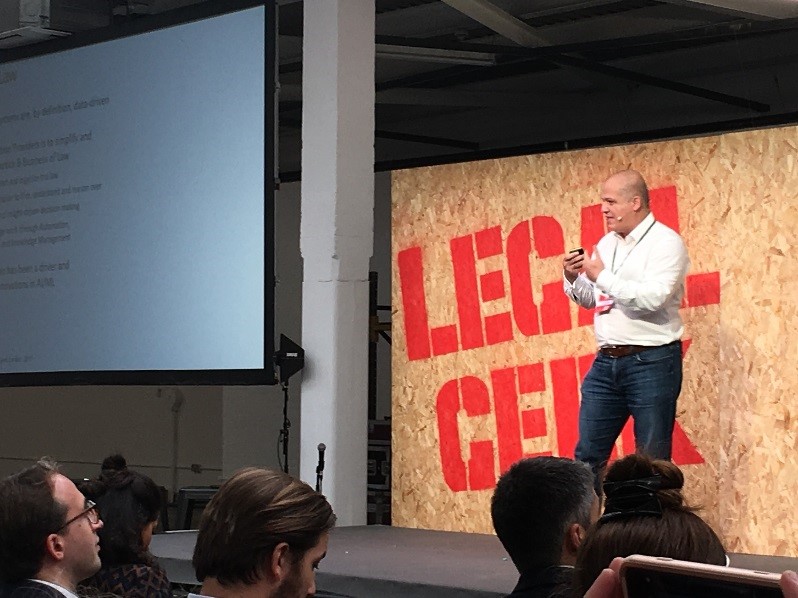The legaltech community in the United Kingdom (UK) is feeling positive—with good reason. Last week’s Legal Geek 2019 conference brought together a dynamic and engaged community of more than 2,000 people, a cross-section of legal practitioners, technologists, legaltech startup executives, regulators, in-house lawyers, legal ops professionals, representatives from courts and government, investors, and students.
As if to bolster their enthusiasm, the event coincided with the release of a new report, produced by Thomson Reuters and Legal Geek, called Legaltech Startup Report 2019, documenting the rise and maturity of the companies that are contributing so much to the digital transformation of the legal industry.
In terms of investment, the report shows that UK legaltech startups attracted £61m (around US $80 million) in 2018, doubling the £22m raised the year before. Further, investments in the first nine months of 2019 have already exceeded £62m.
The report outlines some of the factors that have led to the UK’s emergence as a centre for legal innovation and entrepreneurship:
- An open legal market that has benefitted from regulatory reform, specifically the availability of alternative business structures (ABS) that allow external investment in law firms and has enabled alternative legal service providers (ALSPs) to thrive
- A dynamic and competitive legal market that has driven providers to lower costs and increase value-add with the help of technology
- Access to capital and tax incentives for angel investors
- An excellent tech and data science talent pool, driven by focused development at strong universities
- A community of incubators, accelerators, and labs driven by law firms, tech providers, and the Law Society of England and Wales
- Modernisation efforts driven by the Ministry of Justice (MOJ), particularly HM Courts and Tribunals Service, which is engaged in a comprehensive move to digitise the country’s justice system
Most of those factors don’t work well without the others—creating a whole that is greater than the sum of the parts. It’s that level of integration that sets the UK legaltech scene apart from most other regions.
Some big topics & trends
With more than 100 speakers in several tracks at the event, it’s difficult to pick out highlights, but certainly there were a few recurring themes that bubbled to the top of many conversations:
Growing recognition that law is a data-driven business
Dr. Khalid Al-Kofahi, VP of Research and Development, of Thomson Reuters spoke of the inherent data-driven nature of common law systems, and that the administration of justice and the practice of law builds on the interpretation of legal data—legislation, court decisions, regulations. Al-Kofahi reviewed the technology applications built on top of that data—many of which are provided by those in the room—including research, discovery, document management and analysis, litigation analytics, etc. But Al-Kofahi noted, as did others, that this has led to a fragmented technology ecosystem dominated by point solutions.
The solution to that fragmentation, Al-Kofahi argued, will be a new platform layer—platforms that integrate applications and let them share data.

Thomson Reuters, Khalid Al-Kofahi speaking to the crowd at the annual Legal Geek conference in London.
Richard Mabey of Juro took the discussion further, with a roadmap for building a data-driven legal team. Mabey started with the old cliché that data is the new oil, but he played out its implications for legal teams—using the data you already have in internal systems; building performance metrics into key performance indicators that drive team goals; keeping data present in the form of real-time dashboards, building data skills within the team (which for lawyers can be a simple as making the shift from Word to Excel); and creating a data-driven culture that supports all decisions with data.
Noah Waisberg of Kira Systems, known for using large props as part of his pedagogical toolkit, brought a huge file cabinet-shaped piñata on stage to illustrate that an organisation’s set of contracts have little value when locked away in storage. Only when they are treated as data and analysed with today’s tools are their secrets, risks, and opportunities unlocked. Although, in this case the piñata, when dramatically busted open by Waisberg, proved to be filled with Kira swag to be tossed into the crowd.
In the exhibit space occupied by Legal Geek sponsors, Thomson Reuters highlighted the results of its Legal Data Challenge, which provided a years’ worth of UK High Court data available to participating teams.
Weightmans demonstrated the prototype capacity management tool they had developed based on the data from approximately 25,000 High Court cases across a 10-year period. The tool used the data to model time to judgment depending upon certain case features. Future applications could be used to examine capacity court by court, or to set service levels to assist court users with establishing realistic timelines for judgments or redeploy judicial resources to help manage workloads.
Recognition of the importance of the user experience
Several Legal Geek speakers urged the audience to consider all legaltech through the lens of user experience. Amanda Smith, Head of User-Centred Policy Design at the MOJ, said policymakers are now required to use user-centred design, including interfaces with language designed to better reach users who might be in a state of crisis as they deal with public services and the legal system.
Tim Pullan of ThoughtRiver spoke of flow-state theory—the idea that legal technology should minimise distraction for users and keep them in the flow of their work.
Victoria Sörving of Funnel spoke at the in-house session about her role as the first General Counsel at the startup company. Sörving soon realised that her job wasn’t about legal or about tech, it was about user experience. So, Sörving pivoted to turn herself and the services she offered into the best possible interface to legal challenges for her colleagues—by building trust, transparency, and only then technology.
The idea that platforms are the future
At Legal Geek, as at other recent legaltech events, there seems to be an increasing consensus around the idea that an exploding universe of legaltech applications will lead to the consolidation of applications onto legaltech platforms.
Investors already see this phenomenon. Dan Jansen of Dentons’ Nextlaw Ventures said in his talk in the “Investors and Incubators” session, that one of the things he looked for in an investment target was a vision of what the legal landscape will look like in the future. Jansen also said he wanted to see how the target would envision the role of platforms in rolling multiple point solutions into integrated systems with greater interoperability of functions and data.
Karl Chapman of EY spoke in the in-house session about some of the “no regrets decisions” that GCs must make, including building platforms instead of point solutions for in-house legal departments. Just as human resource departments have Workday, and sales teams have Salesforce, legal needs its own unified platform for delivery of legal services.
Conclusion
It’s easy to be lulled into an exaggerated optimism by all the high-fiving and good vibes that come out of a Legal Geek event, but it’s also not difficult to appreciate that the industry is making good progress because of the ability of stakeholders in the UK market to work together.
There’s perhaps less of the client-vs-firm and lawyer-vs-techie tension that can surface in other legal markets, and more of a sense that the industry is, at least in some dimensions, all on the same side as it works toward a better and more tech- and data-centered legal system.



